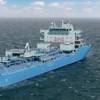The USCG is deploying Virtual Private Networks (VPNs) based on 3Com's wide area network (WAN) systems. Using VPN connections, the agency will be able to quickly transmit mission-critical and administrative information from its land-based facilities to ships at any port where USCG vessels dock.
Deployed in June on cutter Dependable, the 3Com VPN solutions will soon be extended to all of the USCG's 250+ ships. The $1.1 million investment in VPNs is based on 3Com's SuperStack II NetBuilder SI routers and follows the implementation of the Standard Workstation III Local Area Network (LAN) Cabling Project in 1998, when the agency rolled out 3Com Fast Ethernet networks to its entire fleet and many land-based facilities.
Designed to the exacting specifications of the agency's Telecommunications and Information Systems Command (TISCOM) in Alexandria, Va., the USCG's VPNs emerged from the need to replace slow, legacy networks with a high-speed solution compatible with Microsoft Windows NT systems. Having upgraded to switched and Fast Ethernet LANs in each ship and land-based facility in 1998, the agency's wanted to connect ships and shore-based facilities and gain access for the ships to the USCG Data Network WAN backbone.
Working with TISCOM to understand the requirements of the ship-to-shore connectivity, 3Com developed a solution using its proven VPN solutions, which had all the functionality the USCG required. 3Com worked with TISCOM to simulate the ship-to-shore and WAN environment at TISCOM by setting up three SuperStack II NetBuilder SI routers showcasing the routers' tunneling capabilities. The USCG then performed a live demonstration on cutter Dependable.
The new VPN architecture relies on 540 SuperStack II NetBuilder SI routers, one installed in each ship and one in every USCG port, either on the dock or in a building near the dock. By using the Layer 2 tunneling protocol capabilities built into the routers, a ship in a berth far from its home port can activate a tunnel to its home port's router with little or no delay. Data traveling through the tunnel is encrypted for added security on the private USCG network.
Using 3Com VPNs, the USCG will significantly expedite ship-to-shore facilities' use of Microsoft Exchange email, which constitutes 85 percent of all networked communications. Today, these communications include weather reports, equipment repair data, financial information, law enforcement reports, fisheries information and food and supply orders.
Sponsored Content
Innovative Hull Maintenance: Profitable & Green

Subscribe for
Maritime Reporter E-News
Maritime Reporter E-News is the maritime industry's largest circulation and most authoritative ENews Service, delivered to your Email five times per week













